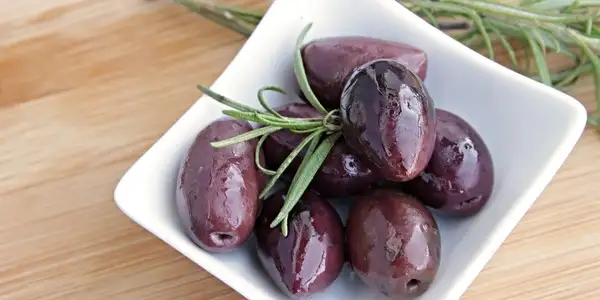
It's no secret that olives are healthy. Pressed into cooking oil or eaten in general, these small fruits are excellent heart helpers. The benefits even go...
Read more


|
Nutrient |
Per 100 g |
|---|---|
|
Calorific value |
2683 kJ |
|
Energy |
640 kcal |
|
Carbohydrates |
12 g |
|
Protein |
25 g |
|
Fat |
53 g |
The food Sunflower seeds is composed of the following macronutrients.
Sunflower seeds have the following health benefits:
Sunflower seeds are the seeds of the sunflower plant. They are commonly used as a snack or as an ingredient in salads, cereals and baked goods. Sunflower seeds can be eaten raw, roasted or salted. They are rich in nutrients such as vitamin E, magnesium, phosphorus and zinc, as well as unsaturated fatty acids, especially linoleic acid, which can have a positive effect on heart health. They are also a good source of protein and fiber and can help lower blood cholesterol levels and aid in digestion. Sunflower seeds are often used as oil or butter, but can also be consumed as a food.
Sunflower seeds are the seeds of the sunflower (Helianthus annuus), a plant originally from North and Central America. They are mainly used as food and as a source of oil.
The seeds are usually obtained from the dried and hulled sunflower seeds.
Sunflower oil is extracted from the seeds and is a popular cooking oil because of its mild flavor and high smoke point. It is commonly used in salad dressings, marinated vegetables, soups and other dishes.
What is the shelf life of sunflower seeds and how should they be stored?
Sunflower seeds should be stored in a cool, dry place to maintain their freshness. They can also be stored in the refrigerator or freezer to extend their shelf life. In general, however, sunflower seeds will keep for several months if stored properly.
Can sunflower seeds replace other nuts or seeds?
Sunflower seeds have a mild, nutty flavor that makes them ideal for salads, cereals, baked goods and snacks. They can be used as a substitute for other nuts or seeds, such as in salads to replace pine nuts or in cereal to replace almonds. However, compared to other nuts such as walnuts or Brazil nuts, sunflower seeds have lower fat and protein content and therefore cannot be used as a substitute in certain recipes based on these nutrients.
I love this app! The food is super varied and filling (and soo delicious!). With one purchase I have the ingredients for a whole week together, thanks to the shopping list. The ingredients are also readily available and not really expensive.
Nicole — App User
The first app in the field of nutrition tips that really convinces me. Updates get minor issues out of the way and new features are added all the time. Top!
Unknown user — App User
ave already tried many nutrition apps but here it is really great and you save a lot of time because you do not have to enter all the meals yourself! 👍👏
Mareen — App User
I don't usually rate apps but this one has to be rated.... I have never had such a great app just fits everything.... The nutrition plans are just absolutely awesome just everything is awesome many many thanks
Mareen — App User
This app is an excellent support for healthy eating even with little time and effort! Super recipes are also included. Highly recommended!
Lennert — App User